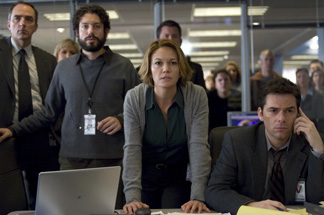|
|
Movie Review: UntraceableBy Matthew HuntleyMarch 23, 2008
For instance, after Jennifer gets a tip about killwithme.com and starts seeing more people die, Griffin mentions, "If only one of the victims was a boy scout, then they could just blink Morse code and tell us where he's keeping them." Now, based on what he just said, we know there must be a scene where Morse Code is eventually used. In a smarter movie, this kind of dialogue might have simply developed Griffin's character (perhaps he was a boy scout once?), but no. It's there because the plot requires it to be. The same goes for a deaf man working in Jennifer's office. It's a rule in Hollywood that any time a character has a physical affliction, it has to be used somewhere down the line to move the plot forward. And that's what's wrong with Untraceable - everything in the movie serves its idiotic plot. I use the word "idiotic" because the characters, including the killer, eventually stop taking the right precautions and make all the usual mistakes. Now I know that all movies are supposed to manipulate the audience to some degree, but that's not the same as being jerked around. There's an art to manipulation, and if the filmmakers get it wrong the audience will lose patience and get defensive. Audiences want to be respected, not patronized; we don't want to see a movie where smart people act stupid. Take the scene near the end that takes place on a bridge. It's dark, cold and raining heavily. Jennifer knows the killer is watching her because he's just turned off her car with some kind of remote control. If Jennifer recognizes she knows this, why the hell would she go back to her car after making an emergency phone call to the other detectives? I mean, I know the reason is so the plot can proceed towards its climax, but still, why? One good thing about the movie is its sympathetic heroine, thanks mostly to Diane Lane's performance. Despite a script she's too good for, Lane is convincing as a cybercrimes agent and does make us care about her. In three different scenes, the movie allows her room to display her emotional range as an actress. The other actors, including Billy Burke as a Portland detective, more or less fill their roles accordingly and aren't given anything interesting to say or do. On some levels, I could see the filmmakers wanted to make a satire (Wikipedia calls the movie a social commentary on Internet schadenfreude). While that's true, the movie makes the mistake of first wanting to adhere to its serial killer plot, which we've seen time and time again. An intelligent satire would have said to hell with the plot and tried making something that really honed in on people's obsessions with the Internet and reality media. But everything here is written or built around a silly potboiler instead of serving something biting and meaningful, and I grew frustrated with it. Every now and then, a Hollywood serial killer movie can be fun and original (Copycat, The Cell), but these days they're too far and few between. Untraceable gets trapped by the genre's antiquated conventions and formulas and it's never able to break free.
|

|
|
|

|
Thursday, October 31, 2024
© 2024 Box Office Prophets, a division of One Of Us, Inc.


